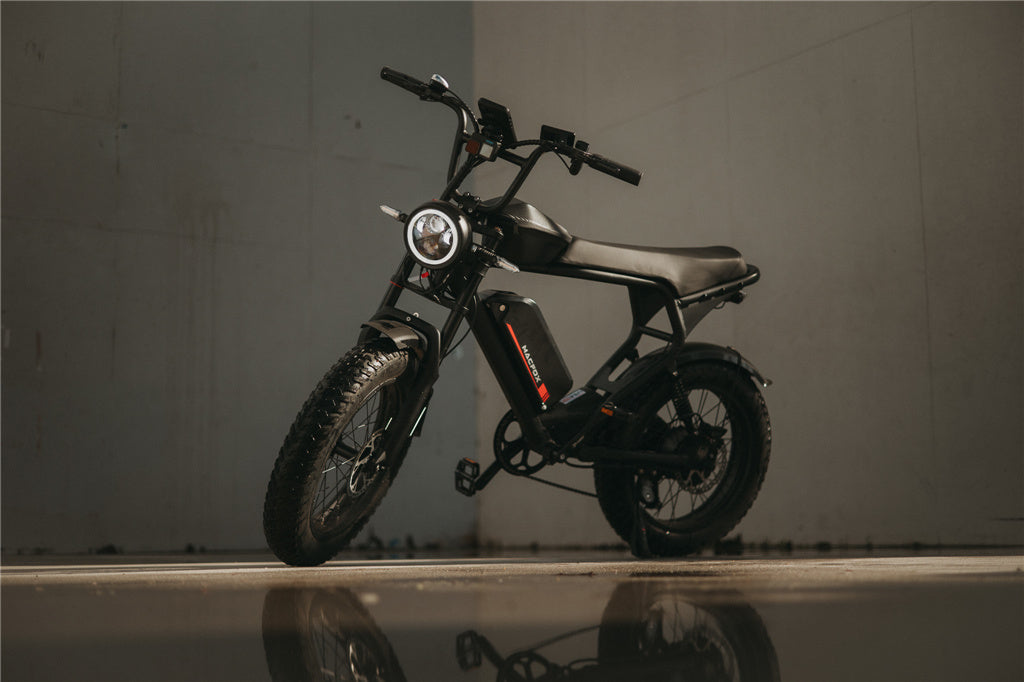Yes—electric bikes are good for your health. Even though an electric bike gives you motor assistance, you still pedal, move, balance, and engage your whole body. The big difference is this: an e-bike (electric bike / electric bicycle / e-bike / ebike / e bike) makes it easier to ride more often, for longer distances, and in more situations—so your total activity and overall well-being often go up, not down.
If you’re wondering whether riding an electric bike “counts” as exercise or if it’s just a lazy version of cycling, this guide breaks down how e-bikes help your body, your mind, and your lifestyle—and how models like the Macfox X1S, X7, and M16 fit into a healthier routine.
Are Electric Bikes Actually Good for Your Health?

Short answer: yes. Electric bikes don’t cancel exercise—they make it more realistic and repeatable.
Here’s what actually changes when you choose an electric bike instead of doing nothing, driving, or only occasionally riding a regular bicycle:
| Choice | What usually happens | Health impact |
| Car / rideshare | You sit, get stuck in traffic | Minimal movement, higher stress |
| Traditional bike | You ride sometimes when you have energy | Great exercise, but inconsistent |
| Electric bike | You ride often because it’s easier | Steady moderate activity, less stress |
-
Pedal and use your legs
-
Engage your core and balance
-
Move your joints through a comfortable range
-
Spend time outside instead of sitting indoors
The motor simply lowers the barrier so you don’t skip rides on tired, busy, or hot days.
Physical Health Benefits You Still Get on an E-Bike
A lot of people think, “If the bike is helping me, am I still doing anything?”
The answer is absolutely—just in a more sustainable way.
Gentle Cardio That’s Easier to Stick With
-
Pedal-assist levels
-
Gears
-
Your own effort
-
Strengthens your heart
-
Improves blood circulation
-
Helps your lungs work more efficiently
Because the ride feels enjoyable instead of brutal, you’re more likely to repeat it again and again—which is where real cardiovascular benefits show up.
Low-Impact Movement That’s Kind to Your Joints
-
Less pounding on knees and ankles
-
Smooth circular motion that keeps joints moving
-
Adjustable effort so you don’t overload weak areas
For people with past knee issues, extra body weight, or just not-great joints, an electric bike can be the difference between “I can’t do cardio” and “I actually have a way to move.”
Daily Activity That Adds Up (Without Feeling Like a Workout)
-
Going to class
-
Grabbing coffee
-
Visiting friends
-
Running quick errands
Now imagine turning a chunk of those into short e-bike rides instead of sitting—in a car, on a bus, or at home.
Even if each ride is only 10–20 minutes of light to moderate pedaling, the total weekly movement adds up fast.
| Activity style | Typical pattern | Weekly movement |
| “Gym only” | 2–3 intense workouts | High effort, low frequency |
| “E-bike lifestyle” | Multiple light–moderate rides | Lower effort, higher frequency |
Health-wise, that second pattern—moving more often, even at moderate intensity—is incredibly valuable.
Mental and Lifestyle Health: Benefits You Don’t See on a Heart Rate Chart

The health benefits of an e-bike aren’t just physical. A huge part of feeling well comes from your mind and your environment—and electric bikes quietly upgrade both.
Less Stress, More Control
-
Predictable travel time – no more guessing how bad traffic is
-
Independence – especially if you don’t drive or don’t have a car
-
A sense of control over your day
Arriving at school, work, or a friend’s place after a calm ride instead of a chaotic commute can completely change the tone of your day.
Built-In Fresh Air & Sunlight
-
Improve your mood
-
Help regulate your sleep cycle
-
Break up long sedentary stretches
An ebike makes “going outside for a bit” way more tempting. You’re not thinking, “Do I have energy for a workout?”—you’re just thinking, “I’ll ride over there.”
More Freedom, More Time
-
Freedom to move when and where you want
-
Time you’re not stuck sitting still
-
Mental space to decompress between responsibilities
-
It turns far-away spots into realistic destinations
-
Cuts commute time compared to walking
-
Creates quiet solo time where you’re moving but not scrolling
How E-Bikes Help Different Types of Riders Stay Healthier
Not everyone rides for the same reason. But for many people, e-bikes solve the exact obstacles that were keeping them from being active.
Students and Young Commuters
-
Your schedule is chaotic
-
Your energy is unpredictable
-
Your budget might not include a car
-
Turn daily routes into consistent movement
-
Arrive not drenched in sweat, but still feeling awake
-
Avoid relying on parents, buses, or rideshare for short trips
The result: more total activity, less frustration.
New or Returning Riders
-
“What if I can’t make it back?”
-
“What if the hills kill me?”
-
“What if my legs die halfway?”
-
Start with short rides
-
Stretch your distance gradually
-
Stay in a comfortable effort zone
Confidence itself is a health benefit—it’s the thing that keeps you moving.
Riders with Limited Time or Energy
-
You’re working or studying long hours
-
You’re tired at the end of the day
-
You don’t have energy for “full send” workouts
-
Choose lower assist for more effort
-
Or higher assist when you’re wiped but still want fresh air
Even a short, easy spin is better for your health than another evening on the couch.
What Makes a “Healthy” Electric Bike Choice?

-
Be comfortable enough for daily use
-
Feel stable and confidence-inspiring
-
Offer adjustable assist so you can control effort
-
Match your height and body type so you’re not straining
Here’s a simple checklist:
| Question | Why it matters |
| Does the bike fit my height? | Good fit = less strain on knees, back, shoulders |
| Can I ride in a relaxed position? | Comfort encourages longer, more frequent rides |
| Is the assist adjustable? | Lets you choose workout days vs. easy days |
| Do I feel safe at the speeds it can reach? | Safety = less anxiety, more consistent riding |
A “healthy” e-bike is not just about motor power or top speed—it’s about whether you’ll want to ride it often.
How Macfox E-Bikes Support Real-World Health (X1S, X7, M16)
Macfox designs its electric bikes around how young riders actually live—not just around spec sheets. For health, that means focusing on comfort, confidence, and rideability, so you’re more likely to choose your e-bike over passive options like cars or couches.
Macfox X1S – Turning Daily Routes into Easy Cardio
-
A natural, bike-like pedaling feel that still gets your heart rate up
-
Assist that keeps you in a sustainable effort zone on hills and longer routes
-
A riding posture that doesn’t punish your back or wrists on daily trips
Health-wise, the X1S shines because it makes daily, moderate-intensity riding feel normal—not like a big event you have to mentally prepare for.
Macfox X7 – Stability for Riders Who Want to Explore More
-
Fat tires help smooth out rough paths and cracks, so your joints take fewer hits
-
A stable stance builds confidence, which encourages you to ride farther from home and explore new routes
-
The power system helps you handle mixed terrain without exhausting yourself early
For health, the X7 is about expansion: more places you can ride, more hours you’re willing to stay out, more chances to disconnect from screens and move.
Macfox M16 – Right-Sized Health for Smaller Riders
-
Lower seat height and compact geometry reduce the fear factor
-
Fat tires and approachable handling make learning and daily riding more forgiving
-
Assist means kids or smaller teens can keep up on family rides, instead of getting discouraged
The M16 supports health by making movement feel possible and fun at a smaller scale, instead of overwhelming.
Across X1S, X7, and M16, the common thread is this:
Macfox isn’t just adding motors—it’s building electric bikes that you actually want to ride often, which is where the real health benefits live.
Final Thoughts: Electric Bikes as a Realistic Health Upgrade
-
Physical: steady cardio, low-impact movement, improved stamina, more total activity
-
Mental: reduced commute stress, more outdoor time, better mood, sense of control
-
Lifestyle: more freedom, more time saved, easier social and daily movement
An electric bike doesn’t have to replace every workout or every traditional bicycle ride. Instead, it turns many “I’ll just sit” moments into “I’ll ride there instead.”
If you want a healthier life but your reality includes hills, busy days, low energy, or limited time, an electric bike isn’t cheating—it’s a tool that makes healthy movement fit into your actual schedule.
And if that tool feels fun, expressive, and built for your size and style—like the Macfox X1S, X7, or M16—you’re far more likely to use it.
That’s the real health benefit of an e-bike:
Not just what it can do, but how often it convinces you to get on and go.




![How Far Is Too Far to Go to Work by Bike? [commuting Advice]](http://macfoxbike.com/cdn/shop/articles/biking-to-work-distance-1-macfox-x7.webp?v=1769763164)












